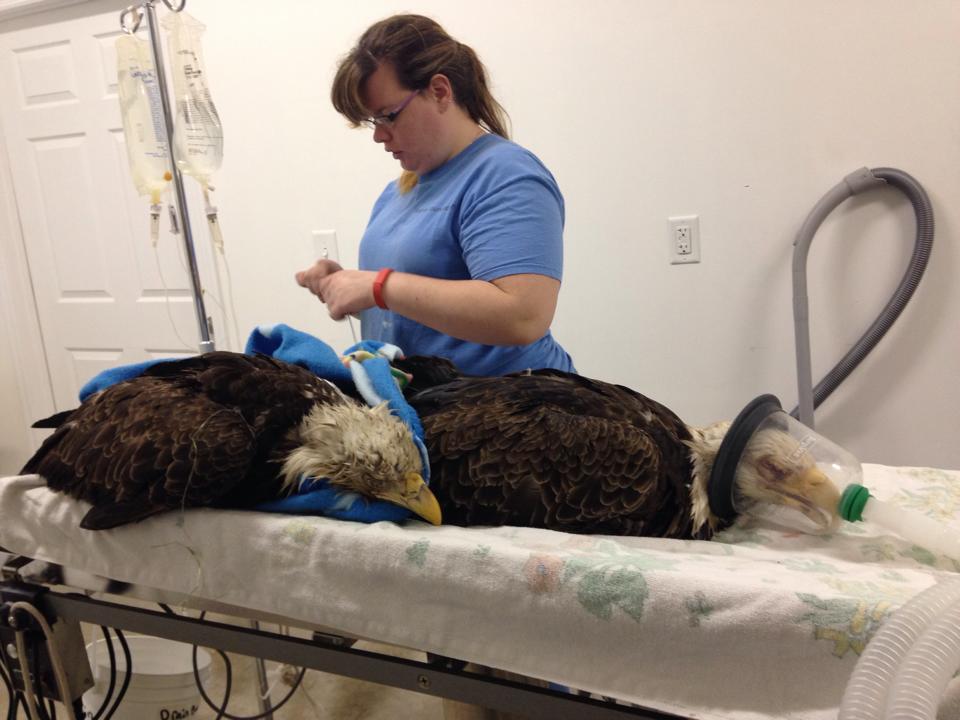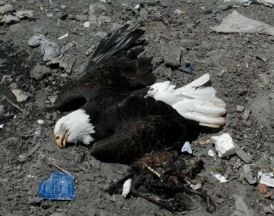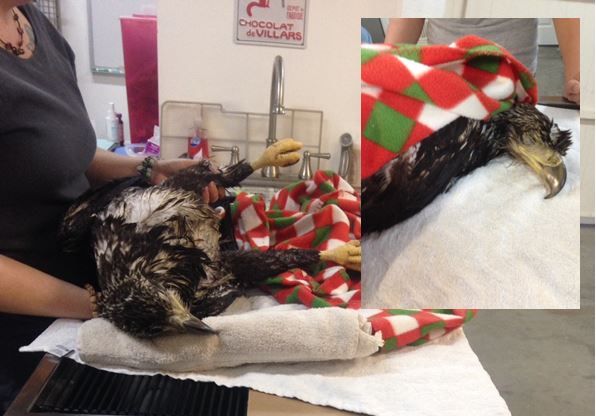
[Last updated February 6, 2015, at 10:46 p.m.]

cat in Florida landfill. The eagle died while it was eating. Photo courtesy of
Special Agent John Rawls, FWS-LE (U.S.
Fish and Wildlife Service Law
Enforcement).
Ocala, Florida —The bald eagle—the symbol of our nation—which is protected under the Bald and Golden Eagle Protection Act, faces a new threat in Marion County today.
Michelle Whitfield, head of the wildlife department at the Animis Foundation, said bald eagles and other wildlife are being poisoned, but not how one would think.
The Animis Foundation alleges that the Marion County Animal Shelter has been recklessly dumping euthanized animals at the Marion County Baseline Landfill, which is located next to the shelter.

Whitfield said two years ago when a bald eagle was found nearly dead at the landfill, Animis and Dr. Shannon Kennedy performed a toxicology screen on the eagle’s blood. She said the results were disturbing. Test results showed the eagle had been poisoned with pentobarbital, a drug commonly used by veterinarians to euthanize animals.
Pentobarbital is a barbiturate, which slows the activity of the brain and nervous system.
Whitfield said the eagles are eating the dead animals that have been discarded by the shelter; therefore, the pentobarbital is being passed onto the eagles.
Now, residents want to know if the animals are being discarded like trash instead of incinerated. Questions about whether or not the drug could seep into the aquifer have also been raised.
“Animis contacted authorities two years ago when we made the discovery. We were under the impression that Audubon would be testing all eagles and reporting the findings to the Florida Wildlife Service (FWS),” said Whitfield. “Yesterday, I found out that nobody has been testing the birds. All of the proper authorities were notified, but nothing has been done.”
On February 2, 2015, two additional bald eagles were found near death at the Baseline Landfill. The eagles were treated for poisoning. Once stabilized, they would be transported to the Audubon Center for Birds of Prey. This makes a total of 10 bald eagles in the past two years that have been found at the landfill.
Marion County officials released the following statement:
“This afternoon, we were made aware of citizen concerns expressed on social media and via emails regarding two distressed bald eagles found at the county landfill facility on Monday. While bird and eagle sightings are not uncommon at landfills, we don’t frequently encounter distressed wildlife at our facility. In these situations, however, addressing the animals’ well-being becomes the staff’s first priority. On that day, Solid Waste immediately contacted a wildlife rehabilitator licensed by the Florida Fish and Wildlife Conservation Commission (FWC), per FWC protocol. As of today, Solid Waste has reached out to the FWC and the rehabilitator for continued updates. The cause of the eagles’ distress is not known or confirmed by any official tests at this time.”
###
The Florida Fish and Wildlife Conservation (FWC), initially, was not involved with this investigation. In fact, the FWC was not even made aware of the situation until February 4, when county officials called the FWC and began to ask questions about Animis.
In an attempt to discredit Animis, the county wanted to know if Animis was associated with FWC, which they are not. Animis is its own licensed entity; however, FWC wanted to make it clear that Animis is on FWC’s approved list of wildlife animals rescue rehabilitators. Animis frequently rescues animals for the FWC if an officer with FWC is not available.
Greg Workman, Regional Public Information Coordinator for the FWC said, “Although we are not heading up this investigation, it is a very serious matter. Bald eagles are federally protected; therefore, this case was turned over to the U.S. Fish and Wildlife Service (FWS). Because it is federal, we felt it would be better serviced if handled by FWS.”
Rumors began to spread through social media the moment Animis posted the story on Facebook, and people quickly began to confuse FWC and FWS, which are two separate agencies. It should be clear that FWC is not the lead in the investigation and was at no point made aware of the situation until yesterday.
Gavin G. Shire, Chief of Public Affairs with FWS, said, “USFWS Special Agents in Florida are conducting a preliminary inquiry with Florida Wildlife Conservation Commission investigators to address this issue.”
In a report published by FWS it states, “Each year a number of bald and golden eagles, other wildlife, and domestic dogs are intoxicated or killed after ingestion of pentobarbital residues in the tissue of exposed euthanized carcasses. Exposure of these carcasses is almost always the result of improper disposal at landfills.”
Ocala Post reached out to the Marion County Animal Shelter and asked what their procedure was for discarding euthanized animals. As always with Marion County officials, Ocala Post never received a reply.
Mara Burger, Public Information Specialist with the Department of Environmental Protection (DEP), said, “The proper disposal of domestic animals is covered by Rule 62-701.520(4)(c), which allows disposal in Class I landfills or on the property where they died. Proper disposal is defined as “buried at least two feet below land surface and above the water table.”
The DEP has not yet responded to Ocala Post’s questions in regards to whether or not there would be an investigation against the Marion County Baseline Landfill.
Ocala Post also contacted the EPA; we are waiting on a response.
Ocala Post received a formal copy of the results from the toxicology performed on the bald eagles by Andreas Lehner, Ph.D., an Analytical Chemist with Michigan State University. The results stated, “There was a moderate amount of pentobarbital, which fits the presumed diagnosis.”
[Updated February 5, 2015, at 8:30 p.m.]
Ocala Post was notified earlier today that one of the bald eagles passed away. The other is still recovering.
Ocala Post was also contacted by several former employees of the Marion County Animals Shelter that wish to do an interview. Stay tuned for those details.
[Updated February 5, 2015, at 9:32 p.m.]
Marion County Public Information Manager, Barbra Hernandez posted the following on Ocala Post’s Facebook page:
“We want to provide you the latest updates regarding the bald eagles located at the landfill facility on Monday. Today, we were able to speak with staff at the Audubon Center for Birds of Prey, who notified us that one of the eagles continues to recover at their facility. Unfortunately, we were saddened to learn that the other eagle did not make it. Audubon Center staff also confirmed that, as of today, no official toxicology tests have been performed. This information was also shared by Dr. Kennedy, veterinarian for the Animis Foundation, with whom we spoke today. Throughout the day, we have received several citizen inquiries regarding the burial of deceased animals at the landfill facility. We know many of you have questions about our Solid Waste and Animal Services policies for handling and properly burying deceased animals. Please know that our departments operate under strict state regulations and county guidelines. We would like to share with you additional information about our practices here: http://marioncountyfl.org/home/showdocument?id=6589.”
How does Solid Waste handle deceased animals at the landfill?
- Step 1: Deceased animals are transported (whether by individual, agency or business) to the landfill’s inbound scale and reported to Solid Waste staff. Scale personnel notify the operators on the landfill.
- Step 2: Operators excavate a hole at least 3 feet or more in depth, exceeding state statute requirements for a hole to be at least 2 feet in depth.
- Step 3: The vehicle containing the deceased animal(s) is brought near the excavated hole for depositing. The landfill operator completes the deposit and covers with materials excavated from creating the hole.
- Step 4: Operators continue to push and pack materials over the surface until end of work day.
- Step 5: On closing, operators cover all areas on which they worked with a 6-inch dirt cover or a tarp, both methods authorized by the FDEP permit.
When a pet owner brings their pet in to be euthanized, the pet owner would have the choice of taking the body of the animal home or allow the animal to be discarded with the trash at the landfill.
[Updated February 6, 2015, at 10:46 p.m.]
After this story went viral, Elaine DeIorio McClain, Public Information Officer for the Marion County Office of Public Information, responded to Ocala Post’s information request. However, the response contained information Ocala Post had previously included in the article.
Stay tuned to Ocala Post for updates, as Ocala Post is waiting on further correspondence from FWS.
